Affiliate Disclaimer
Some links in this article are affiliate links. We may earn a small commission if you make a purchase through these links, at no extra cost to you. We only recommend products we find useful to our readersHave you ever encountered a situation where you failed to recognize a smell? Various conditions can cause a sudden loss of the sense of smell. While some conditions are temporary, others can be permanent.
Home remedies for Anosmia are effective in treating the condition. By the end of this article, you will understand Anosmia and the home treatments that can help cure it.
What is Anosmia and What Causes it?

The complete loss of smell is called Anosmia. It may be caused by different conditions, but it can often be reversed. Since your sense of smell affects things like taste and how you perceive the world, it’s essential to understand this condition and learn how to manage it.
Your lack of smell can result from several factors, primarily nasal congestion, but some of the other common causes behind Anosmia include:
- Cold and cough
- Allergies
- Sinus infection
- Nasal polyps
- Head trauma or nasal injury
- Prolonged exposure to toxic materials
- Selected medications
- Cocaine abuse
- Old age
- Medical conditions like Alzheimer’s
- Exposure to radiation treatment
How To Treat Anosmia?
When it comes to treatment, home remedies for Anosmia work like magic. Let us look at some of the most effective home remedies for Anosmia treatment:
1. Castor Oil
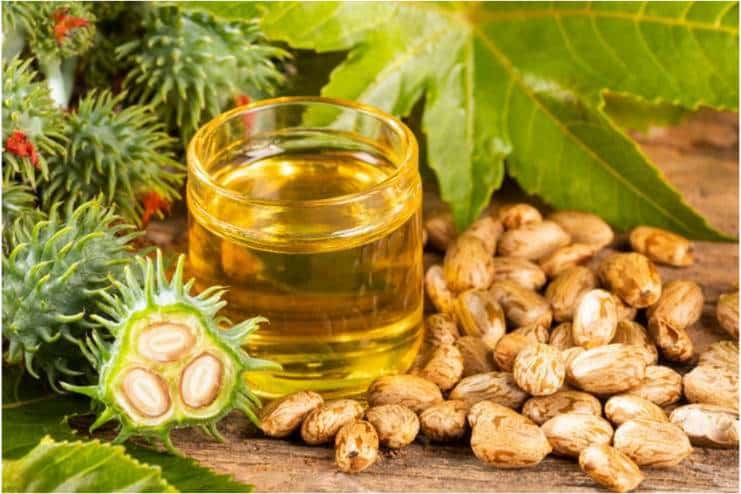
Castor oil, with its anti-inflammatory and antimicrobial properties, has been found to benefit the treatment of Anosmia.
If you have blocked nostrils that have been making it hard for you to breathe and activate your sense of smell again, castor oil plays can help.
What to do?
- Take some castor oil on your finger
- Rub it inside your nostril, inhaling the oil to get it through the nasal pathway
- Do it a few more times till you can feel the airways open up
How often?
- Once every 3-4 hours
2. Garlic

Garlic is one of the best home remedies for Anosmia. The main reason behind this is its anti-inflammatory properties. Garlic has been found to eliminate inflammation affecting the nasal pathway. This promotes better breathing and is associated with restoring the sense of smell.
What to do?
- In a deep vessel, boil some water
- Add 1-2 chopped garlic cloves
- Let it boil for 5-10 minutes
- Close the lid and leave it to steep for 5 minutes
- Strain the liquid and drink that
How often?
- Once every day
3. Essential Oils

Essential oils have been around for quite some time and offer many benefits. If you have been experiencing Anosmia and want to keep the condition in check, aromatherapy can help.
These aromatic essential oils are mostly plant-derived and can help open up the airway. Some essential oils that work well include peppermint, lavender, tea tree, lemon balm, and eucalyptus.
What to do?
- Pour a few drops of the essential oil or blend different oils into a diffuser
- Leave it on through the night in the bedroom
How often?
- Daily until your nasal passages open up
4. Ginger

Much like garlic, ginger has been found to help with Anosmia. Ginger has beneficial anti-inflammatory (R) properties and essential antimicrobial properties, which have been found to benefit the body and clear out the blockage in the airways you have been struggling with.
Additionally, ginger root has been found to benefit colds and coughs, restore one’s sense of smell, and restore the taste buds.
What to do?
- Boil some water in a pot
- Add 1 inch of crushed ginger into the boiling water
- Let it boil for 10 minutes
- Close the lid and let it steep for 10 minutes
- Strain the liquid and add some honey
- Drink this to clear out the mucus accumulation
How often?
- 1-2 times daily
5. Steam Inhalation
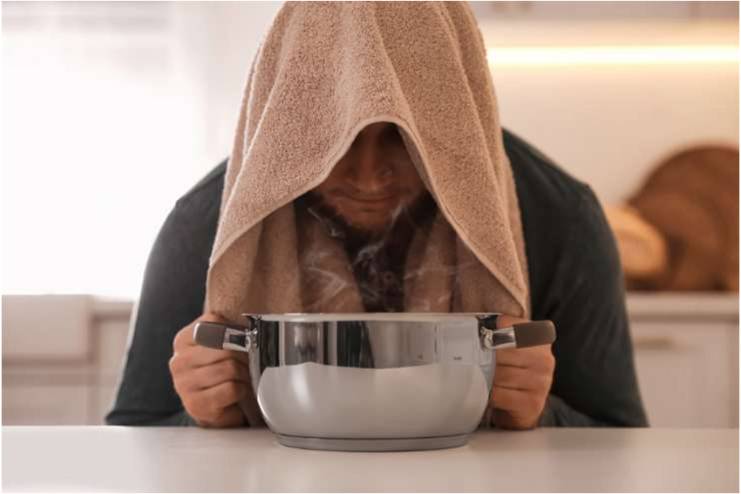
Steam inhalation throughout the day can help alleviate the signs and symptoms of blocked nasal passages. To avoid harming your skin, ensure the steam isn’t too hot and keep a safe distance from the boiling water.
What to do?
- Boil some water in a deep vesseled pot
- Once done, place the pot on an elevated spot
- Cover the top of your head with a towel, ensuring that the heat is trapped inside
- Inhale the steam through your nostrils, ensuring to keep your mouth closed
- Do this for a few minutes each time
How often?
- Once or twice daily
6. Apple Cider Vinegar

Apple cider vinegar is touted as one of the most effective home remedies for Anosmia and a number of other conditions. Its combination of effective antimicrobial (R) and anti-inflammatory (R) properties has been found to help with the condition. The anti-inflammatory properties eliminate any persistent inflammation in the airways that could be causing Anosmia.
What to do?
- In a glass of warm water, mix 1 tsp of apple cider vinegar
- Add 1 tsp of honey (optional)
- Drink this in the morning
How often?
- 1-2 times daily
7. Cayenne Pepper

Another excellent home remedy for Anosmia is cayenne pepper. It may not be obvious, but cayenne pepper can help with nasal blockages. The active ingredient, capsaicin, reduces inflammation and increases saliva production, which helps restore your sense of taste and smell and relieves nasal congestion.
What to do?
- In a glass of water, add 1 tsp of cayenne pepper and 1 tsp of honey
- Mix everything to make a wholly dissolved solution
How often?
- Once every day
8. Massage
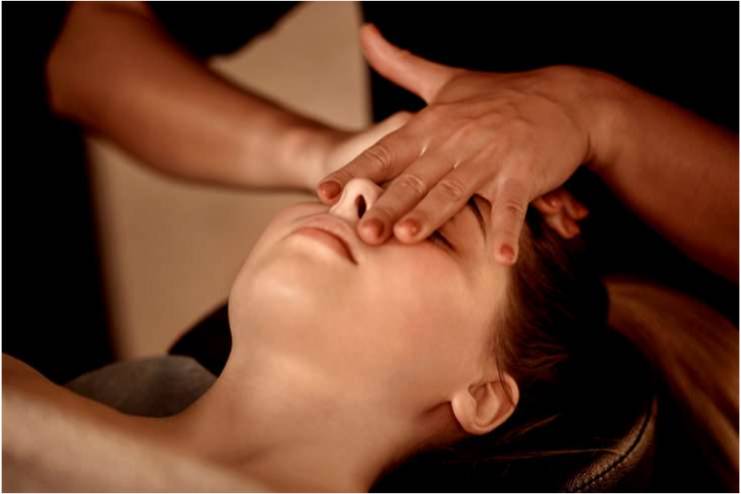
Gently massaging the nasal area can significantly improve your sense of smell. Blend a few drops of soothing oils like wheat germ and chamomile, then apply the mixture to your nasal region. Massage gently and circularly to relieve congestion and stimulate your nasal pathways.
What to do?
- Mix a few drops of wheat germ and chamomile oil in your palm
- Use your fingers to blend the oils
- Apply the mixture to the entire nasal area and gently massage in a circular motion
- Extend the massage around the cheeks and the back of your ears for more impact
How often?
- Massage multiple times throughout the day to help restore the sense of smell and alleviate congestion
9. Lemon

Lemon has been found to restore the sense of smell and taste that people struggle with when suffering from anosmia. It is an effective antioxidant, and vitamin C helps restore and boost the immune system, which further helps fight any inflammation or signs of infection you are struggling with.
What to do?
- In a glass of warm water, add the juice of one lemon
- Add 1 tsp of honey
- Stir everything to ensure that everything is dissolved
- Drink this in the morning
How often?
- 1-2 times daily
10. Hydration

Hydration can help reduce inflammation and ward off problems associated with a blocked nose. Drinking plenty of water boosts the immune system, thus further helping to keep the signs and symptoms of Anosmia at bay.
What to do?
- Drink water throughout the day to keep yourself hydrated
- Consume 8-10 glasses of water daily
How often?
- Maintain this daily hydration routine to help reduce inflammation and support overall health
11. Bentonite Clay
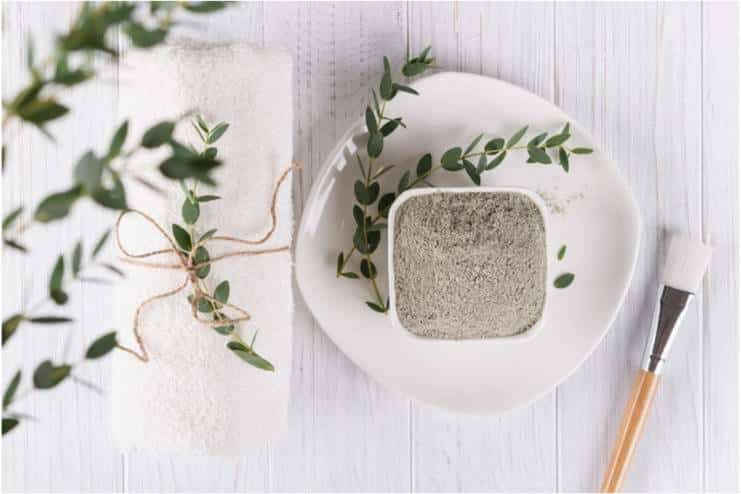
Not many know that Bentonite clay is another underrated Anosmia treatment. Evidence suggests that bathing with bentonite clay can be effective in helping with the condition of Anosmia that you have been struggling with all this time.
What to do?
- Mix the bentonite clay with water to form a paste
- Apply the paste to your body or areas where you experience congestion or discomfort
- Let it dry for 10-15 minutes before rinsing with warm water
How often?
- Use this treatment 1-2 times a week
12. Vitamins and Supplements

Anosmia has been linked to the lack of several vitamins in the body. Some vitamins and minerals whose deficiency has been found to impact the sense of smell include zinc, Vitamin B6, Vitamin B12, magnesium, and even Vitamin D3.
It is essential to get the deficiency tested before you take supplements.
What to do?
- Identify any vitamin or mineral deficiencies through a blood test
- Take supplements or consume foods rich in deficient vitamins or minerals as a healthcare provider recommends
How often?
- Follow the dosage instructions provided with the supplements or, as your healthcare provider advises, usually daily
13. Carom Seeds
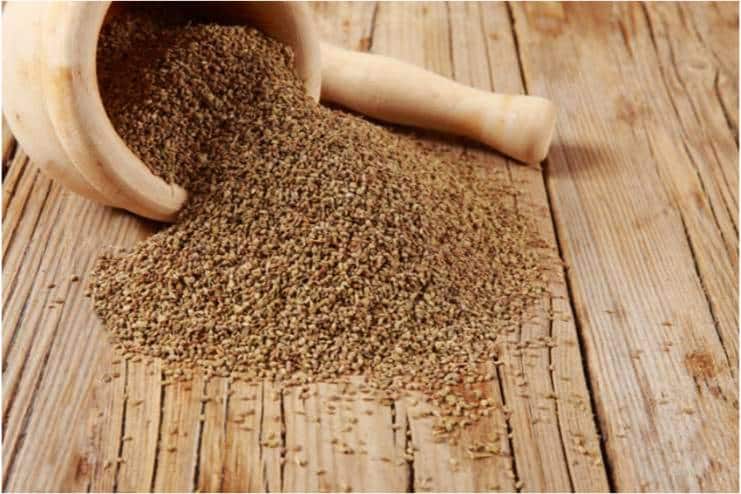
Carom seeds have antimicrobial (R) and anti-inflammatory (R) properties, which help reduce inflammation and nasal blockage that could further aggravate the symptoms of anosmia.
What to do?
- Boil some water pot
- Add 1-2 tsp of carom seeds and bring to a boil
- Simmer for 10 minutes more
- Cover with a lid steep for 2-3 minutes
- Strain the liquid and drink while warm
How often?
- 1-2 times daily
14. Cinnamon

The combination of cinnamon’s antimicrobial and anti-inflammatory properties has been found to have a tremendous impact on improving the sense of smell and taste. It helps cure the signs and symptoms of colds and coughs.
What to do?
- In a bowl, add 1 tbsp of cinnamon powder and 1 tsp of honey
- Make a thick paste
- Apply this paste on the tongue in a thick layer
- Leave it on for 10 minutes
How often?
- Once daily till you get the senses of smell and taste back
How Long Does Anosmia Last?
There is no standard time frame for how long anosmia can impact your health and prevent you from being able to smell properly. It can last anywhere from 3 to 7 days, depending on how quickly you recover from cold and cough symptoms.
Some effective preventive measures include:
- Keep yourself hydrated
- Enhance your diet to include necessary vitamins and nutrients
- Get proper sleep to let your body rest and to boost immunity further
Home remedies for Anosmia are some of the most effective remedies to treat the symptoms. Try some of them, and let us know if they work for you!
-
Dec 2020Written by Somapika D
-
Sep 2024Edited by Ankita
In this Article



















